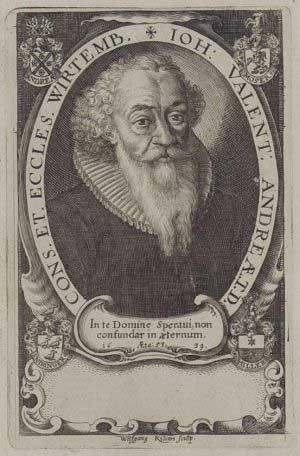We are delighted to bring you news of a momentous arrival: from today, the first instalment of Johann Valentin Andreae’s substantial correspondence  is available for consultation in the front end of EMLO. This publication marks a significant milestone in the history of Cultures of Knowledge and we could not be more pleased to share with you records for 3,696 manuscript letters (from what will be an eventual total of more than 4,500) contributed by our esteemed partner, the Herzog August Bibliothek [HAB] in Wolfenbüttel.
is available for consultation in the front end of EMLO. This publication marks a significant milestone in the history of Cultures of Knowledge and we could not be more pleased to share with you records for 3,696 manuscript letters (from what will be an eventual total of more than 4,500) contributed by our esteemed partner, the Herzog August Bibliothek [HAB] in Wolfenbüttel.

Engraving of Johann Valentin Andreae by Wolfgang Kilian (source of image: Herzog August Bibliothek, Wolfenbüttel).
Work on this catalogue extends back to the very first days of CofK when, at a Phase I technical workshop, our Project Director Howard Hotson remembers Jill Bepler leaving Oxford to return to Wolfenbüttel with the remark that it was ‘time to get going on Andreae’. This was in 2010 and, since the HAB obtained the necessary funding from the Deutsche Forschungsgemeinschaft in 2012, we have worked towards this moment in partnership with staff at the HAB, and in particular with Dr Stefania Salvadori, who is immediately responsible for the exemplary ‘Inventory of the correspondence of Johann Valentin Andreae (1586–1654)‘. The German theologian, reformer, and churchman Andreae, a figure highly representative of his era, now takes his place in EMLO alongside two younger contemporaries inspired directly by his work: Jan Amos Comenius [Komenský] and Samuel Hartlib. This catalogue pilots cooperation also between two of the greatest libraries founded in the century of Andreae, Comenius, and Hartlib: England’s Bodleian Library and Germany’s Herzog August Bibliothek.
Although most of Andreae’s earliest correspondence was destroyed by a fire in the city of Calw in 1634, the surviving collection amounts to more than 4,500 manuscript letters to and from the theologian. By far the greatest portion of this vast correspondence is the care of the HAB: some 5,672 folios entered the library over a short period of time, not only because Andreae wrote tirelessly to Duke August the Younger himself, but also as a result of the collection and purchase of others by Wolfenbüttel’s librarians in the years following Andreae’s death. The 3,715 letters published in EMLO today range in date from 1630 to 1654. Work to prepare the remaining section of this enormous correspondence is underway, to be added in a second instalment during the coming months. Each letter record in EMLO links straight through to both the HAB’s OPAC catalogue entry and to the relevant MS guardbook, and we hope very much that interested users are able to carve out time over these summer months to explore this large and magnificent jewel of an early modern correspondence.
